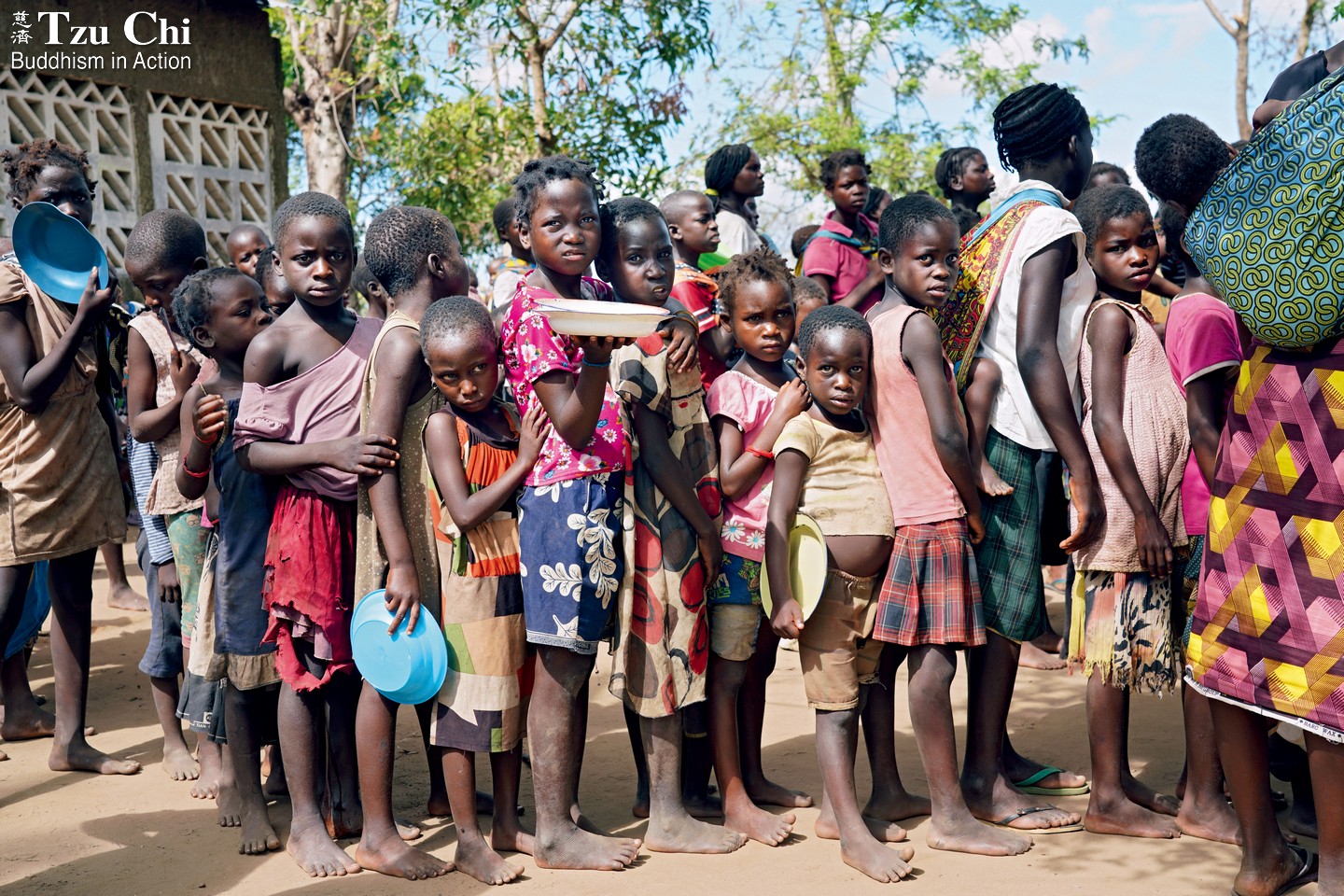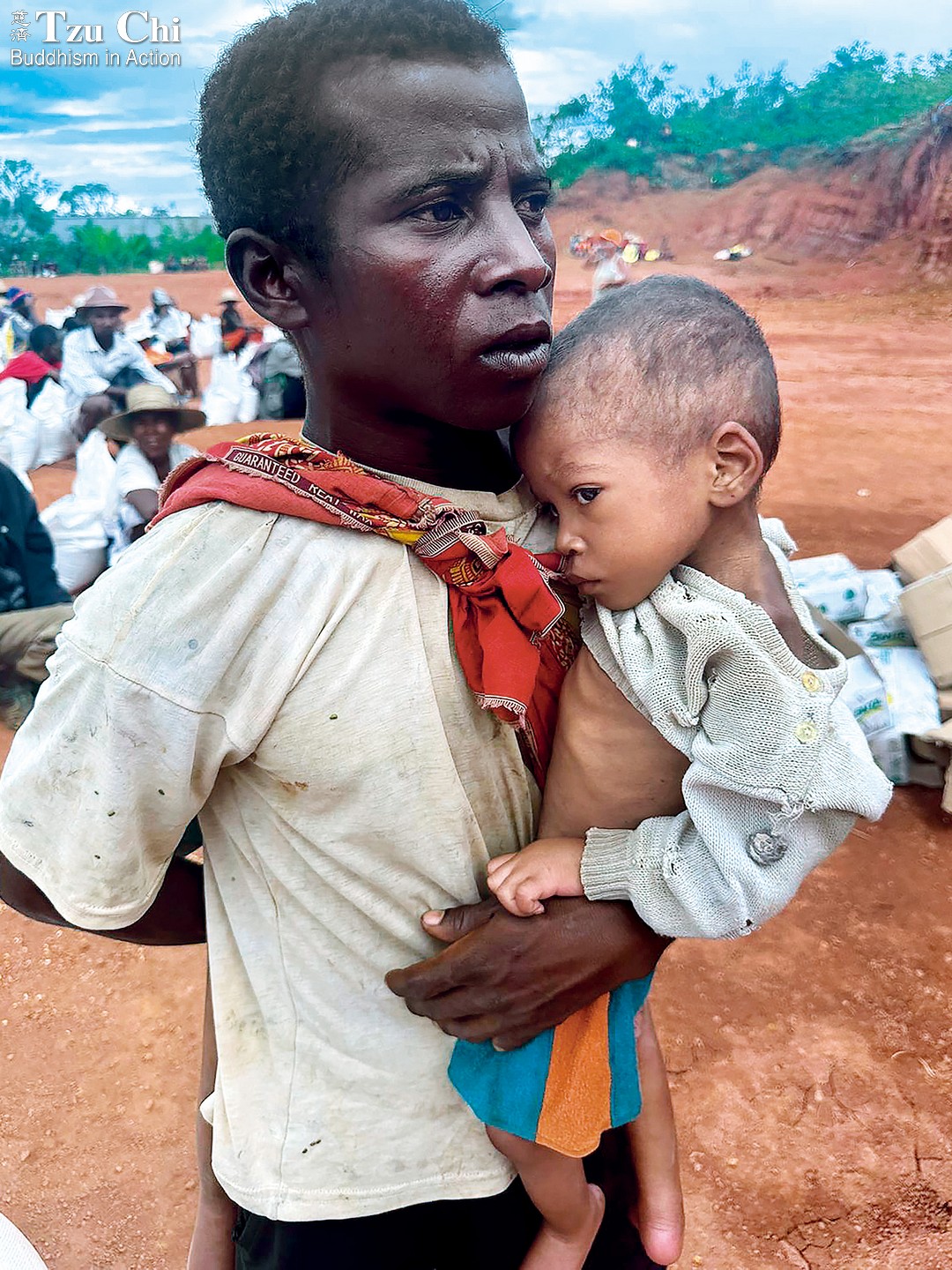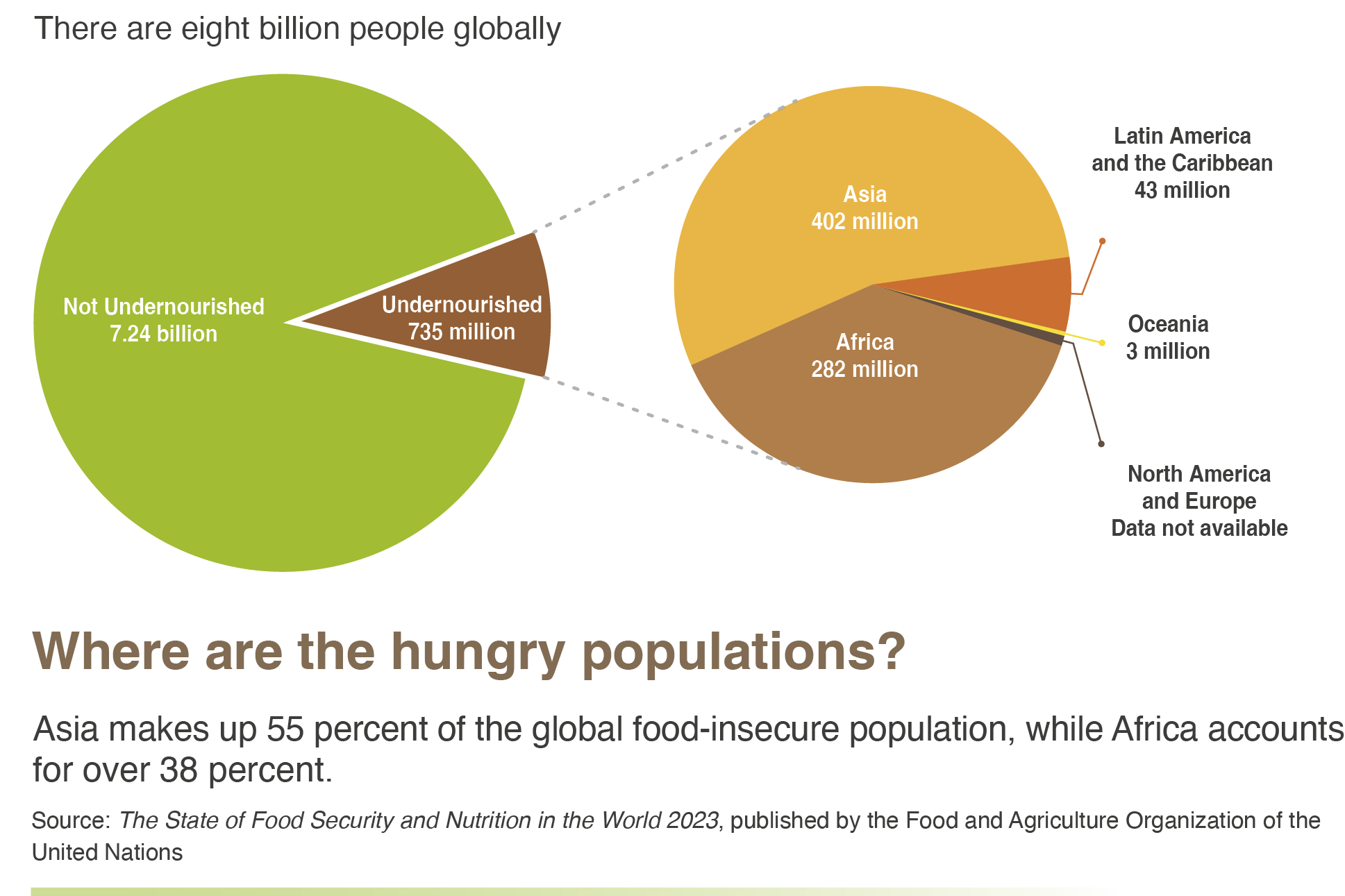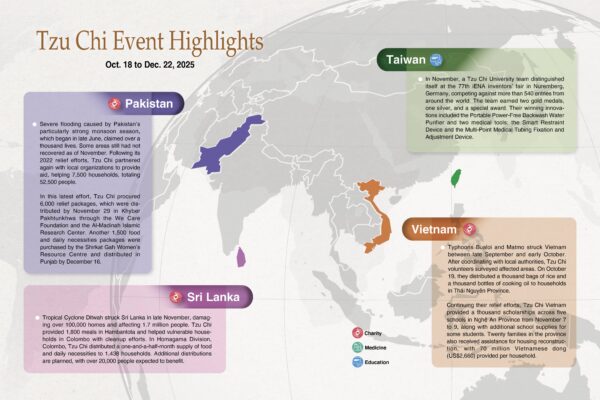
Cyclone Idai devastated Mozambique in the spring of 2019. Here, children wait for hot meals distributed by a charitable organization in a tent area in Sofala Province. Hsiao Yiu-hwa
Extreme weather, regional conflicts, and inflation are increasing the risk of food shortages. Tzu Chi’s charitable efforts not only provide emergency food aid but also support long-term solutions, such as agricultural recovery.
Preventing Food Shortages From Becoming Disasters
By Yeh Tzu-hao
Translated by Wu Hsiao-ting

A catastrophic famine in Madagascar, induced by climate change, led to severe malnutrition among young children. Courtesy of Tzu Chi Foundation
The Indian Ocean island nation of Madagascar, located off the southeast coast of Africa, has been identified by the United Nations (UN) as the world’s first location of a famine caused by climate change. Four years of drought had already led to poor harvests, but the situation worsened in early 2022 when four consecutive tropical cyclones struck the region.
To survive, people resorted to eating locusts, wild cacti, and even boiled shoe leather. Despite these desperate measures, the famine continued to worsen. Malnourished mothers could not produce milk, leaving infants emaciated, reduced to skin and bones.
“Zero Hunger” ranks second among the UN’s 17 Sustainable Development Goals (SDGs), following “No Poverty.” Around five billion of the world’s eight billion people have sufficient food, but hunger remains a critical issue for far too many people. UN statistics indicate that 2.4 billion people worldwide faced moderate to severe food insecurity in 2022, with about 735 million enduring long-term shortages. As climate change escalates and conflicts increase, food shortages and the resulting humanitarian crises are expected to worsen.

Rice from Taiwan
In response to the famine in Madagascar, the Tzu Chi Foundation partnered with the local Lions Club of Farafangana to provide food assistance. In April 2022, food and daily necessities were distributed to 1,460 households across four villages in the Mananjary region, marking Tzu Chi’s first mission in the country.
In 2023, Tzu Chi provided additional aid by shipping 120 metric tons (132 short tons) of Taiwanese white rice to Madagascar. After it arrived, the rice was transported on a three-day journey over rough, muddy roads and by canoe before being distributed at ten events in southeastern and southern regions. This aid reached 4,973 households—about 25,000 people. Despite scorching temperatures exceeding 40°C (104°F), weary residents greeted the aid with smiles. Women balanced their aid packages, including rice, corn, and peanuts, on their heads as they walked for hours to return home. They didn’t mind the weight or distance. Instead, they were relieved and grateful for the much-needed food.
With 70 percent of Madagascar’s 28 million people living below the poverty line, Tzu Chi’s food aid mission continues, with plans to donate 240 metric tons of rice in 2024.
“We are grateful to Taiwan’s Agriculture and Food Agency for providing rice over the past 21 years, helping Tzu Chi bring sustenance and hope to disaster-affected residents and the poor in struggling nations,” said Simon Shyong (熊士民), deputy CEO of the Tzu Chi charity mission. He elaborated on Tzu Chi’s efforts in securing public grain for international aid. The Agriculture and Food Agency began accepting applications for humanitarian rice aid in 2002. Since then, Tzu Chi has exported over 154,000 metric tons (169,755 short tons) of Taiwanese rice, assisting the needy in 20 countries, 17 of which are classified by the UN as facing moderate to high levels of food insecurity. This aid has benefited millions of people.
In 2024, the rice applied for by Tzu Chi is expected to help ten countries and regions in Africa and Central America. Among the Central American countries receiving this aid, Haiti faces the most significant challenges due to frequent violence from armed groups. To ensure smooth distribution, local Taiwanese businesspeople—long-time partners of Tzu Chi in Haiti—have coordinated with military and government units, working to shorten the time between customs clearance and distribution, reducing risks and ensuring that the rice reaches those in need safely.
Africa is the most frequently cited region when discussing global food insecurity and poverty. “Of the 55 countries in Africa, Tzu Chi has provided aid to 36 and continues to support 13,” said Yang Xiu-guan (楊琇光) of Tzu Chi’s Overseas Charity Division. She explained that the foundation has been adapting its international aid to local conditions, and in recent years, increased its use of locally sourced relief goods to minimize the carbon footprint of shipping.
Ethiopia serves as a good example. Tzu Chi began providing aid for this East African country over 30 years ago, and since 2022, it has distributed food packages to some of the estimated three million people displaced by civil war and drought. In May 2023, when the foundation partnered with the local organization Kidmia Mahiber to provide relief in drought-affected southern regions, the relief goods were sourced locally within Africa.
Since 2003, with Tzu Chi’s help, rice from Taiwan’s public grain reserves has been distributed to those in need across 20 countries, including Madagascar (photo 1 by Lan Xiang-you) and Mozambique (photo 2 by Hsiao Yiu-hwa). Indonesia was the first country to receive this rice. Photo 3 shows a member of the Tzu Chi Collegiate Association assisting an elderly woman with her rice during a distribution in Jakarta in 2011 (photo by Chandra Wijaya).
Assisting with agricultural production
The specific targets of SDG 2 (Zero Hunger) include ensuring year-round access to safe, nutritious, and sufficient food for all people and eradicating all forms of malnutrition. Other areas of focus include enhancing agricultural productivity and incomes for small-scale food producers and implementing resilient food production systems. Distributing food directly plays a crucial role in providing immediate relief and addressing hunger in countries facing food shortages and high food prices. However, to build long-term resilience against hunger crises, it is vital to strengthen local agricultural production and food self-sufficiency.
Tzu Chi provides emergency food aid to address immediate needs, but it also assesses local conditions to determine whether to offer additional support, such as providing seeds, fertilizers, and irrigation to help restore agricultural productivity after disasters. Deputy CEO Simon Shyong explained, “Our foundation evaluates the local environment, lifestyle, and whether the land and water conditions are suitable for farming. If conditions permit, we consider providing agricultural support.”
For instance, following the Eastern China floods in 1991, Master Cheng Yen instructed Tzu Chi’s disaster relief team not only to distribute rice but also to provide rice seeds to farmers. The Master explained that while rice addresses immediate hunger, seeds guarantee future crops and sustained food production.
In 1994, when drought and floods struck Cambodia’s western region, Tzu Chi extended its aid by providing rice, seeds, and over a hundred water pumps. These pumps were used to draw river or floodwater for irrigating parched rice fields. This support helped revive agricultural production in affected areas. In April 1995, as a gesture of gratitude, Cambodia’s deputy minister of the interior brought rice harvested from restored fields to the Jing Si Abode—the Buddhist convent founded by Master Cheng Yen in Hualien, Taiwan—and expressed thanks on behalf of the assisted farmers.
In the 21st century, Tzu Chi’s response to Cyclone Nargis in Myanmar in 2008 is a notable example of stimulating agricultural recovery. Daw Thida Khin (李金蘭), head of Tzu Chi Myanmar, described the devastation: farmers lost their homes and cattle, and their fields were damaged by saltwater intrusion. Without external aid, widespread selling of land seemed inevitable. Fortunately, Tzu Chi provided fast-growing rice seeds and fertilizers, enabling farmers to resume their farming and avoid further debt. These efforts played a significant role in helping farmers recover from the disaster and rebuild the country’s agricultural sector.
During their distributions in Myanmar, Tzu Chi volunteers shared the story of how the foundation began. It started with 30 housewives who saved small amounts of grocery money in bamboo coin banks every day to help the needy. Inspired by this account but lacking ready cash, a farmer suggested saving a handful of rice instead of coins, leading to the creation of the “rice bank” concept.
“Many villagers felt that saving a handful of rice to help others was a simple yet meaningful act,” Daw Thida Khin shared. “We have seen entire villages participating, and the collected rice supports poverty alleviation efforts within the communities.” This initiative has fostered a compassionate spirit of helping those worse off than oneself, thereby alleviating hunger and poverty.
Enhancing agricultural productivity in rural areas is one effective method for eliminating hunger. As part of its international relief efforts, Tzu Chi has provided seeds and irrigation support to aid post-disaster farming (photo 1 by Hsiao Yiu-hwa). In October 2023, severe flooding struck central Myanmar. Photo 2 shows affected farmers in the town of Okkan returning home with fertilizers distributed by Tzu Chi in February this year, which they were able to use in time for their crops (photo by Phyo Pyae Aung).
Great Love Farms
In the same way that the rice bank campaign in Myanmar enables those with limited finances to help others, local Tzu Chi volunteers in Africa have established vegetable gardens and farms, using the harvest to support those in need and in vulnerable situations.
Following Cyclone Idai in 2019, Tzu Chi volunteers in Mozambique expanded their farming model to alleviate poverty from the capital to Metuchira, Nhamatanda District, in Sofala Province—a region severely impacted by the cyclone. Initially, only two hectares of land were cultivated in Metuchira, but the project inspired over a thousand people to join Tzu Chi’s charitable farming efforts.
Mozambique lacks a nationwide water irrigation system, and many elderly farmers, unable to carry water, generously offered their land to Tzu Chi for cultivation. As the farming efforts grew, they expanded beyond Metuchira to other areas in Nhamatanda. More than 2,000 volunteers in Nhamatanda formed teams to fetch water from wells and rivers for irrigation. “This demonstrates a remarkable collective effort,” said Denise Tsai (蔡岱霖), head of Tzu Chi Mozambique.
The Great Love Farms established by Tzu Chi produce a wide variety of crops, including staple foods like corn and vitamin-rich vegetables such as pumpkins, tomatoes, and sweet potato leaves. Peanuts, an important source of protein and oil, are also cultivated.
Originally, the farms’ harvests were intended to aid the impoverished. However, when the COVID-19 pandemic triggered a national state of emergency, lockdowns left many urban workers unemployed, forcing them to return to their hometowns. The produce from the farms helped ease the financial burden for many returnees in Metuchira.
“We planted 16 hectares of corn this year, marking our first large-scale cultivation of grain crops,” Denise Tsai remarked. “The harvest will be milled into cornmeal to provide meals for primary school students.”
At EPC Luís Joaquim Mara, a school Tzu Chi helped build in Metuchira after Cyclone Idai, impoverished students often came to class hungry, which affected their ability to learn. Some even skipped classes. To address this, volunteers began providing hot meals to students last year, expanding the program to twice a week this year. Some of the food provided has been rice from Taiwan. “However, we are committed to working towards self-sufficiency,” Tsai emphasized.
A woman in Malawi carries cornmeal from Tzu Chi’s agricultural project on her head while accompanying South African volunteers on visits to the needy (photo 1). Tzu Chi provides seeds to villagers in Blantyre and Chikwawa for cultivation (photo 2), with part of the harvest going to support charitable efforts. Yuan Ya-Chi
Aiming for self-sufficiency
In Durban, South Africa—south of Mozambique—Tzu Chi volunteers have established over 200 hot meal stations across various communities, providing meals to orphans, the elderly, and other underserved individuals. Volunteers also cultivate vegetable gardens to grow food for these stations.
“We encourage our volunteers to inspire their communities to grow their own food rather than relying on external aid,” said Tzu Chi volunteer Yuan Ya-Chi (袁亞棋), based in Durban. “When people grow their own food, they can support themselves and even share with others in need.” Despite these efforts, the initiative to promote vegetable gardens has faced challenges. Yuan explained that South Africa’s economy, compared to neighboring countries, is relatively better off. As a result, low-income individuals often receive aid from the government and charitable organizations, fostering a dependency on welfare. With limited participation from younger community members, older Tzu Chi volunteers have teamed up with members of the Tzu Chi Collegiate Association to cultivate vegetables, using the produce, along with rice from Taiwan, to sustain the hot meal stations.
“We hope that each community will take the initiative to grow their own vegetables so they no longer need to rely on charity,” Yuan added. “We tell our volunteers that this reflects the spirit of Master Cheng Yen and the nuns at the Jing Si Abode. Under the Master’s guidance, the nuns abide by the principle of ‘no work, no meal.’ They grow their own food and engage in handiwork and other work to support themselves while doing charity. This is the message we aim to share.”
Tzu Chi has also launched an agricultural project in Malawi, another African country. In Blantyre, 50 farmers from seven villages have joined the initiative, with Tzu Chi providing corn and soybean seeds, fertilizers, and farming implements to help them achieve self-reliance.
Anie Tambula, a 60-year-old participant who joined Tzu Chi in 2019, owns 1.5 hectares of farmland. Due to an El Niño-induced drought this year, she harvested only 350 kilograms (770 pounds) of corn. Despite this, she still chose to donate a hundred kilograms. Concerned, her fellow volunteers asked, “Your harvest was already small, yet you’re still donating. Will you have enough to live on?”
“If it weren’t for Tzu Chi’s help with seeds, we would have had nothing,” Anie said. “I have enough, so I’m giving back with gratitude, hoping to help others.” Stelia Kambenje, another local volunteer who also donated part of her harvest, echoed her sentiments. In this impoverished region, their generosity helps ensure more people are spared from hunger.
Food systems transformation
Food systems were highlighted as a central issue for the first time at the 2023 COP28 UN Climate Change Conference. Similarly, during a pre-COP29 meeting in Germany this June, the transformation of food systems was identified as a key agenda item for the upcoming year-end conference. Looking ahead, to eliminate hunger and sustainably feed the global population, food producers must increase their output while also reducing carbon emissions to help keep global warming below the 1.5°C threshold.
There is no single solution to prevent hunger from turning into a catastrophe, but building self-sufficiency, developing sustainable agriculture, and reducing food waste are crucial steps. For many years, Tzu Chi has provided food aid to impoverished and disaster-stricken communities, first helping individuals survive and then offering long-term support, such as assisting with post-disaster farming recovery. These efforts alleviate hunger and promote food sustainability.
Master Cheng Yen has noted that seeds harvested from mature plants can be replanted, creating a continuous cycle. Tzu Chi’s commitment to giving, like the seeds they provide, is boundless, working towards a more equitable world.
How Tzu Chi Is Tackling Food Insecurity
Restoring Agriculture in Disaster-Stricken Areas
Providing varying degrees and forms of assistance—including seeds, fertilizers, and irrigation support—to aid agricultural recovery in Myanmar, Cambodia, the Philippines, China, Lesotho, Zambia, Mozambique, Sri Lanka, and more.
Food Distribution
Tzu Chi has established branches in 68 countries and regions, offering regular poverty relief and emergency aid. Over the years, rice from Taiwan has been sent to 20 countries, 17 of which are classified as having moderate to high food insecurity.
Setting Up Hot Meal Stations
Serving meals to the elderly, sick, and impoverished in communities across South Africa, Mozambique, Eswatini, Zimbabwe, Haiti, and other regions.
Nutritional Support
Distributing nutritious food to undernourished villagers and children with low BMI in countries including India, Mozambique, and Indonesia.



